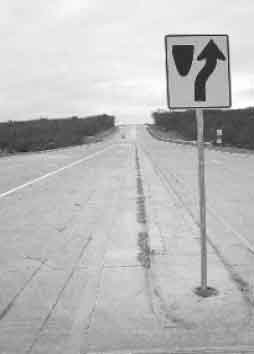“That’s my toll booth,” Tom Ditzler says, laughing when his wife, Jan, mentions the portable toilet that the county has left stationed on an island in the road. “Every car has to drop a quarter in as they pass by.”
This November day is bitter, in more ways than one. After almost three years of legal battles and construction snafus, the Harrison-Springfield extension—a massive four-lane road that completes a loop around Rockford—has finally opened to traffic. Reports from the ribbon-cutting ceremony this morning caused a stir among local activists, when a caller to a radio talk show claimed that he had seen Tom embracing Kris Cohn, the Winnebago County Board chairman who has pursued the extension with an intensity bordering on the demonic. While the Ditzlers had received an invitation from the county to attend the ribbon-cutting (a slap in the face that is typical of Winnebago County under her current chairman), Cohn is more likely to reconvert to her ancestral Catholicism than Tom is to hug her: Cohn’s “leadership” on this issue cost Ditzler, a veteran who lost his sight serving in the U.S. Army, more than half of his 17-acre homestead, which was taken from him through a particularly nasty form of eminent domain called “quick take” (see “For Keeps! A Christian Defense of Property,” Views, April 2001). Now, the road runs a few dozen feet from his front door. One of his few consolations may be that his tollbooth is unlikely to bring him more than coffee money, since traffic—wildly optimistic estimates of 6,000 cars per day from the county notwithstanding—is extremely light here on opening day.
As Aaron Wolf and I commiserate with the Ditzlers, a reporter from a local TV station saunters across all four lanes and back again, not even bothering to watch out for cars. He has no need to worry; he’s more likely to be struck by lightning in the middle of the road. The previous section of the Harrison-Springfield extension—a mile or so of concrete heading west-northwest from South Main Street—has been open for several years, and it is still so desolate that children could play football in the road without fear. The concrete, however, is already beginning to crack—more proof of the quality workmanship of local public-works contractors such as Rockford Blacktop (whose motto is “Paving the Planet for Over 55 Years.” As Dave Barry would say, I’m not making this up. See the logo on their website, www.rockfordblacktop.com).
Rockford Blacktop has suffered several embarrassments during the construction of the Harrison-Springfield extension, most notably when a 66-foot stretch of pavement in the west-northwest lanes simply fell in after the marshy ground beneath it gave way, probably because of the winter frost melting. While Blacktop and the county tried to play down the trouble, the Ditzlers—who, unlike the county engineers, knew their own land and had predicted such problems—say that trucks were dumping fill in the hole constantly for weeks. Even now, the trouble spot is obvious, partly because the concrete is newer and lighter-colored, and partly because cracks have begun to appear in the eastbound lanes directly across from the hole.
Under Illinois’ quick-take legislation, the county was able to seize the Ditzler’s land without paying them in advance. After multiple court appearances, including the trial of their daughter, Christina, for supposedly throwing mud at a sheriff’s deputy on the day that the bulldozers started tearing up their land (she was found not guilty), the Ditzlers finally grew tired and settled for about $105,000—$63,485 for the confiscated land, and another $41,515 “in lieu of replacing a bridge over Kent Creek that was torn down during the highway construction,” as the local Gannett paper phrased it. (Note the passive language: “was torn down.” By whom? Did they have a right to tear it down? The bridge, as well as numerous trees that were cut down along the banks of the creek, was entirely on land not seized by the county. Let nothing and no one stand in the way of the passive march of progress.)
When Tom and Jan invite us inside, we are reminded of perhaps the greatest of their consolations: A constant stream of friends and well-wishers, many of whom rallied around them during their long battle, flows in and out of their door. While they thank us profusely for the national attention that Chronicles brought to their case, our actions were minor compared to the hundreds of hours that others spent in the vain attempt to help them save their land. The local politicians and land developers whose blind trusts control the property along the Harrison-Spring-field extension may make a killing off of the new road, but their wealth will always pale alongside of the human riches that Tom, Jan, and Christina Ditzler enjoy.

Leave a Reply